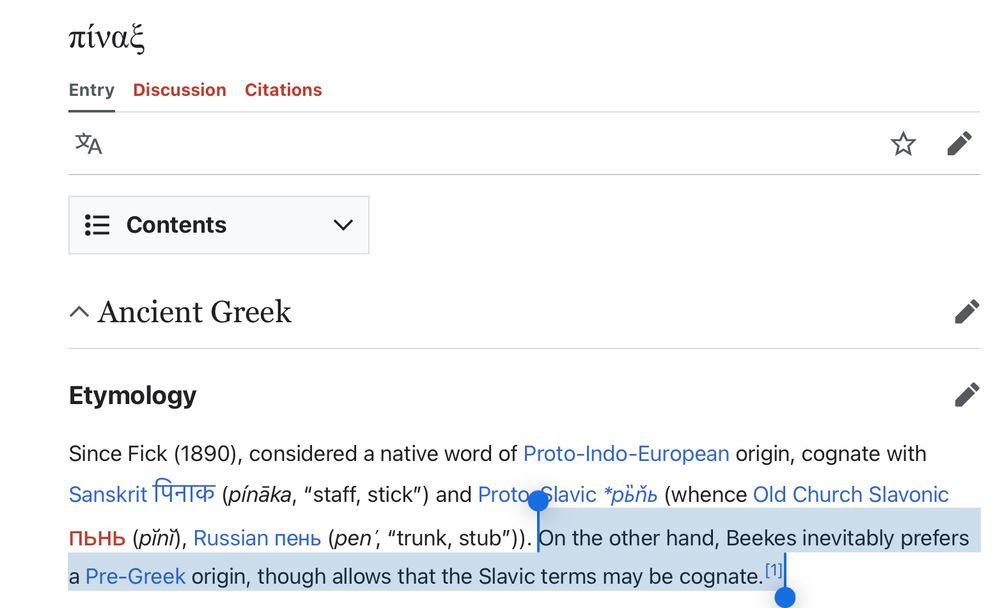
ان جاء زيدٌ او حضر عمرو
طب و احنا مالنا ان شٱلله ما حضرو
0:40
youtu.be/ROFw6yG-msk?...

ان جاء زيدٌ او حضر عمرو
طب و احنا مالنا ان شٱلله ما حضرو
0:40
youtu.be/ROFw6yG-msk?...

but btw an etymon of jararank w/o initial /a/ (as proposed in the *gla- idea) would also lend itself to eg > jrink better than *jararank which i would've thought would reduce to *jarrank
but btw an etymon of jararank w/o initial /a/ (as proposed in the *gla- idea) would also lend itself to eg > jrink better than *jararank which i would've thought would reduce to *jarrank
*at times (re)borrowed from turkish to arabic, ie i dont think that was the original route but it could have happened later to produce forms like jānarik?
*at times (re)borrowed from turkish to arabic, ie i dont think that was the original route but it could have happened later to produce forms like jānarik?
hell even the word greengage in english has similar consonants and a/
hell even the word greengage in english has similar consonants and a/
this idea so far hedges for basically
this idea so far hedges for basically
surely instead can eriği was borrowed from arabic or the same source as arabic (wanderwort?), albeit maybe reborrowed at times
surely instead can eriği was borrowed from arabic or the same source as arabic (wanderwort?), albeit maybe reborrowed at times
in a vacuum they could be understandable reduplications of jrink or something, but that kind of derivation just doesn't happen in (levantine) arabic specifically
in a vacuum they could be understandable reduplications of jrink or something, but that kind of derivation just doesn't happen in (levantine) arabic specifically
they're def not backformed singulars or else we'd see normal vowelings like *jVnrVk too… *maybe* janark, *jarank as loan reductions then *jarank > jirank > jrink?
![screenshot of twitter convo:
@badrophobia · 3/22/20
Okay let's settle this [posted a poll, results follow]
Jaranek: 16%
Jrink: 9%
Jnarek: 2%
Janerek: 73%
266 votes · Final results
[8 comments] [6 retweets] [5 likes] [0 bookmarks]
Robert
@bemyieh
I mean i say janark
07:21 · 3/22/20
[1 reply] [0 retweets] [1 like] [0 bookmarks]
@badrophobia · 3/22/20
LEH FE ALEF KELME
[0 replies] [0 retweets] [0 likes] [0 bookmarks]](https://cdn.bsky.app/img/feed_thumbnail/plain/did:plc:5gvygd24ilrqmbgsii2zzp3v/bafkreib4gicszz2dhirdxyopugohleoagkxp55vhc4dxwmaqtymbi6fxw4@jpeg)
they're def not backformed singulars or else we'd see normal vowelings like *jVnrVk too… *maybe* janark, *jarank as loan reductions then *jarank > jirank > jrink?
(the d -> j makes me think portuguese although of course there's no "de la" in portuguese...) (also if the plum was named after her during her lifetime it could be old enough to support crazy sound shifts over time…?)
![screenshot of wiktionary entry:
French
Etymology
Earlier prune de la Reine Claude, named after Queen Claude (1499–1524).
Pronunciation
• IPA(key): /ʁɛn.klod/
Audio (France (Lyon)): [playable audio file]
Noun
reine-claude f (plural reines-claudes)
1. greengage (plum with greenish-yellow flesh and skin)](https://cdn.bsky.app/img/feed_thumbnail/plain/did:plc:5gvygd24ilrqmbgsii2zzp3v/bafkreihtd3rtyxe4d6mfwwltue7vwokqqoo2qvjplzaspmcyzcf6g74cii@jpeg)

(the d -> j makes me think portuguese although of course there's no "de la" in portuguese...) (also if the plum was named after her during her lifetime it could be old enough to support crazy sound shifts over time…?)



